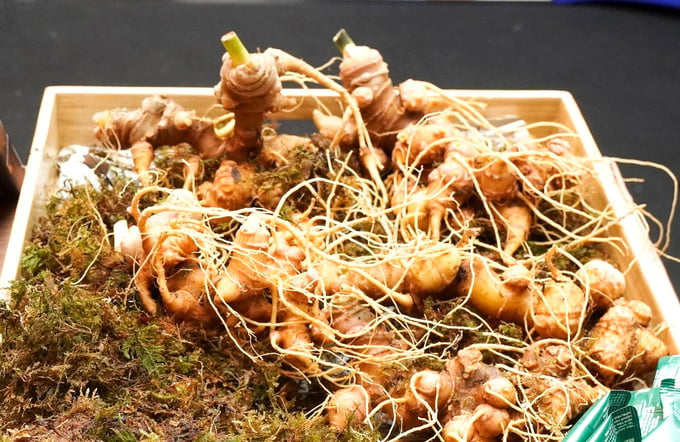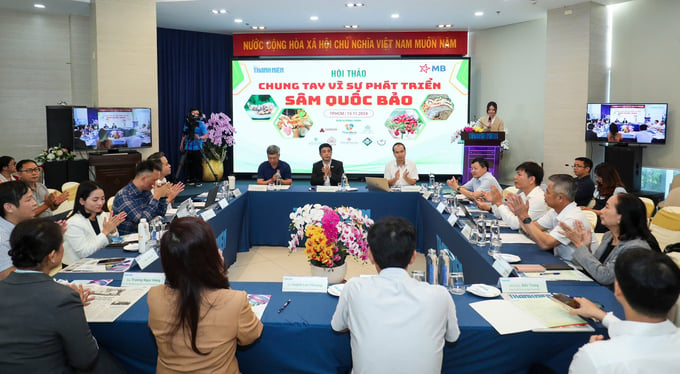June 16, 2025 | 08:51 GMT +7
June 16, 2025 | 08:51 GMT +7
Hotline: 0913.378.918
June 16, 2025 | 08:51 GMT +7
Hotline: 0913.378.918

Vietnamese ginseng has high economic value.
At the seminar titled “Joining Hands for the Development of National Treasure Ginseng”, organized by Thanh Nien News in collaboration with Military Bank (MB Bank) lastweek, journalist Lam Hieu Dung, Deputy Editor-in-Chief of Thanh Nien, highlighted that Vietnam boasts two types of ginseng—Ngoc Linh ginseng and Lai Chau ginseng—both designated as “national treasures” by the government and collectively referred to as Vietnamese ginseng.
Medicinal specialists confirmed while on the seminar that Vietnamese ginseng is the most superior in the world, with a saponin content that significantly surpasses that of ginseng from other countries.
On June 1, 2023, the Prime Minister issued Decision No. 611 on the "Vietnamese Ginseng Development Program until 2030, with Orientation to 2045" in order to capitalize on the immense potential of Vietnamese ginseng. The objective of the initiative is to transform Vietnamese ginseng into a high-value economic sector. Nevertheless, the industry is presently confronted with a variety of obstacles, such as those associated with the leasing of forest environments.
Mr. Pham Hong Luong, the Deputy Director of the Forestry Department (Ministry of Agriculture and Rural Development), has stated that despite the specific tasks outlined in Decision 611 for the development of Vietnamese ginseng, the implementation is hampered by challenges, particularly in the leasing of forest land for medicinal plant cultivation. The ministry is currently in the process of establishing a legal framework to facilitate the establishment of development agendas by localities and to promote the involvement of enterprises and communities.

“Joining hands for the development of national treasure ginseng” seminar.
Dr. Pham Ha Thanh Tung of the Vietnamese Institute of Ginseng and Medicinal Research underscored a lesson from South Korea's flourishing ginseng industry to transform Vietnamese ginseng into a high-value economic sector
South Korea markets its ginseng variety as a whole, rather than emphasizing the superiority of one region's ginseng. Red ginseng accounts for 89% of the total market value of Korean ginseng, which has reached USD 1.7 billion. Dr. Tung emphasized that Vietnamese ginseng has a substantial advantage, with an M2 extract efficiency of 3.1%, which is an optimal rate for the development of commercial products.
Mr. Nguyen Duc Luc, Chairman of the Ngoc Linh Ginseng Association in Quang Nam and Chairman of the Board at Sam Sam Co., Ltd., underscored the necessity of a specialized ginseng research institute to cultivate high-quality ginseng varieties. This would foster confidence in producers' cultivation and promote growth.
Mr. Ho Quang Buu, Vice Chairman of the Quang Nam Provincial People's Committee, emphasized the importance of research and development of novel ginseng varieties with higher saponin content and the ability to withstand climate change to enhance the economic value and quality of Vietnamese ginseng.
The industry must be developed through collaborative endeavors to increase the shared value of Vietnamese ginseng. Mr. Nguyen Trong Lich, the Deputy Director of the Department of Agriculture and Rural Development in Lai Chau, emphasized the importance of localities fostering a cooperative environment and collaborating, rather than making claims that the ginseng of one region is superior to that of another. Rather, the emphasis should be placed on the exceptional quality of Vietnamese ginseng as a whole.
Translated by Linh Linh
![Turning wind and rain into action: [4] Bringing climate bulletins to remote and isolated areas](https://t.ex-cdn.com/nongnghiepmoitruong.vn/608w/files/linhnhp/2025/06/14/1152-z6704423696987_15fd32ffc26d590d204d520c9dac6786-nongnghiep-151141.jpg)
(VAN) The Vietnam Agriculture and Nature Newspaper interviewed Mr. Vu Thai Truong, Acting Head of Climate Change and Environment at UNDP Vietnam, to gain deeper insight into how climate bulletins are delivered to farmers.

(VAN) In Tien Giang, a high-tech shrimp farm has developed a distinctive energy-saving farming model that has yielded promising results.
![Turning wind and rain into action: [3] 300.000 farmers benefit from agro-climatic bulletins](https://t.ex-cdn.com/nongnghiepmoitruong.vn/608w/files/news/2025/06/12/e5a48259d6a262fc3bb3-nongnghiep-125122.jpg)
(VAN) The agro-climatic bulletin has become a valuable tool for farmers in the Mekong Delta. After more than five years of implementation, the initiative is gradually being expanded nationwide.
![Turning wind and rain into action: [2] Providing forecasts to the people](https://t.ex-cdn.com/nongnghiepmoitruong.vn/608w/files/news/2025/06/12/e5a48259d6a262fc3bb3-nongnghiep-103927.jpg)
(VAN) In addition to improving the quality of hydrometeorological forecasts, putting forecast bulletins into practical use is crucial for production and disaster prevention.

(VAN) Blue carbon is receiving attention for its rapid absorption capacity and vast potential. It represents a promising nature-based solution to respond to climate change.
/2025/06/11/3507-1-161904_583.jpg)
(VAN) Seagrass beds and coral reefs serve as 'cradles' that nurture life in the ocean depths, creating rich aquatic resources in Vietnamese waters.
![Turning wind and rain into action: [1] Forecasting for farmers](https://t.ex-cdn.com/nongnghiepmoitruong.vn/608w/files/news/2025/06/11/e5a48259d6a262fc3bb3-nongnghiep-111919.jpg)
(VAN) Weather is no longer just a matter of fate. Forecasts have now become an essential companion for farmers in every crop season.